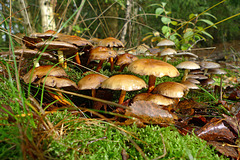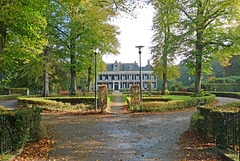Jaap van 't Veen's photos with the keyword: gemeente De Wolden
Nederland - Ruinen, Echtens Paradijs
| 28 Feb 2024 |
|
|
|
Echtens Paradijs (Paradise of Echten) is a 1,200-hectare nature reserve in the Ruinen forestry area. Originally virgin and inaccessible, the area was planted with coniferous forests in the 1930s; nowadays, these are increasingly being replaced by broad-leaved forests. Another part of the area consists of heathland, shifting sands and fens.
Nederland - Huis te Echten
| 26 Feb 2024 |
|
|
|
Huis te Echten (Echten Manor) is a so called havezate (fortified house, homestead, court or farm of a nobelman). As early as the 13th century, there is mentioned a hofstat (homestead, large house with land) belonging to Volker van Echten, a descendant of the viscounts of Coevorden. It is not certain whether this hofstat was the later Huis te Echten . Parts of the current house probably date from the 15th century.
A moat around the building dates from before 1700. The house was probably converted into a house around a courtyard with two wings in the early 18th century. Due to a later renovation in 1808, many older building elements disappeared. Later, parts of the building were added on the north and south sides.
Huis te Echten was inhabited until 1971 by the families Van Echten and Van Holthe tot Echten. After the death of the last Mr Van Echten, his daughter Anna Geertruida married Rudolph Otto van Holthe in 1802, who started calling himself Van Holthe tot Echten. Their descendants continued to inhabit the manor.
The house was restored from 1976 to 1981. From 1975 to 2023, Stichting Visio - a foundation for visually and mentally handicapped people, was housed in Huis te Echten .
Nederland - Ruinen, De Zaandplatte
| 04 May 2018 |
|
|
|
De Zaandplatte is a windmill in a hamlet called Engeland , just outside the village of Ruinen and nearby National Park Dwingelderveld . Its name is derived from its current location, a former piece of ferocious land with the name De Zaandplatte .
It is a thatched, octagonal wooden ‘belt mill’ ( belt is a man made elevation) dating from 1964. Although originally the mill - dating back to the end of the 18th century - stood in the village of Echten and was in a bad state of dilapidation. It was demolished in 1962 and rebuilt and put back in operation about 9 km’s away on its current location. In the past Ruinen had thirteen windmills, De Zaandplatte is the only remaining one.
Initially the rebuilt mill was used as a holiday home. After the restoration at the end of the 20th century the ownership of the mill was transferred by the municipality to a foundation Vrienden van de Ruiner Molen . Since then the mill is grinding again and is running on a voluntary basis.
In 2007 De Zaandplatte was chosen as the most beautiful mill of the province of Drenthe. Although with limited hours, the mill is open for visitors.
Nederland - Dwingelderveld
| 22 Apr 2018 |
|
|
|
Dwingelderveld is one of the about twenty national parks in the Netherlands and is the largest European wet heathland area. The national park - 3.700 hectares - has more than sixty fens and peat swamps featuring a rich and unique flora and fauna. The gently rolling moors and shifting sands are habitat of many kinds of species of butterflies and birds. The northern part has been wooded with pine forests and juniper shrubs since the mid 19th century. The national park is crossed by many hiking and biking trails, marked and unmarked, paved and unpaved.
Dwingelderveld is managed by the Dutch forestry Commission ( Staatsbosbeheer ) and the private Dutch society for nature conservation Natuurmonumenten . Since 1991 it is a national park and in 2013 the park was added to the List of Nature 2000, as part of the European Network of most valuable nature reserves of Europe.
Main picture and PiP’s are all taken along the so called Commissaris Cramerpad . This path - about 4 km’s long between Spier and Kraloo - was chosen in 2017 as the most beautiful bike path of the province of Drenthe. Having been there I only can agree.
See for more pictures of Dwingelderveld : www.ipernity.com/doc/294067/46540292
Nederland - Dwingelderveld
| 20 Apr 2018 |
|
|
|
Dwingelderveld is one of the about twenty national parks in the Netherlands and is the largest European wet heathland area. The national park - 3.700 hectares - has more than sixty shallow lakes and moors featuring a rich and unique flora and fauna. The gently rolling moors are habitat of many kinds of species of butterflies and birds. The northern part has been wooded with pine forests and juniper shrubs since the mid 19th century.
Dwingelderveld is managed the Dutch forestry Commission ( Staatsbosbeheer ) and the private Dutch society for nature conservation Natuurmonumenten .
The main picture shows the recently built lookout tower nearby the Benderse sheepfold, offering unique views over the vast heathlands (PiP) of the national park. This sheepfold houses a flock of the famous ‘Drenthe heath sheep’.
See for more pictures of Dwingelderveld : www.ipernity.com/doc/294067/46551468
Nederland - De Wijk, Wieker Meule
| 05 Apr 2016 |
|
|
|
The ‘Wieker Meule’ (Mill of De Wijk) is an octagonal three storey smock mill on a two-storey wooden base. The stage is almost nine metres above ground level; the four sails do have a span of 22,50 metres.
The mill was built in 1829 with elements coming from a mill in nearby Staphorst, dating back to the year of 1764. In an addition to the two pairs of pairs of stones driven by the wind, an extension was built against the base of the mill which housed two pairs of millstones driven by a diesel/electric engine.
In 1926, the mill was bought by an agricultural bank and the ground floor was used as a bank office. Till the year of 1962 the Wieker Meule was used commercially. The mill fell into disrepair and in 1980 it was completely renovated. Since then the mill is often used for grinding corn, nowadays owned by a local society with volunteers.
Nederland – Dwingelderveld
| 22 Dec 2015 |
|
|
|
Dwingelderveld National Park is a heathland and woodland reserve of 3,700 hectares in the south-western part of the province of Drenthe in the Netherlands. It is Europe's largest wet moorland area, covered by numerous moors, idyllic fens and marsh flats featuring a wide variety of rare plants.
And wet it was during our visit !!
Jump to top
RSS feed- Jaap van 't Veen's latest photos with "gemeente De Wolden" - Photos
- ipernity © 2007-2025
- Help & Contact
|
Club news
|
About ipernity
|
History |
ipernity Club & Prices |
Guide of good conduct
Donate | Group guidelines | Privacy policy | Terms of use | Statutes | In memoria -
Facebook
Twitter







